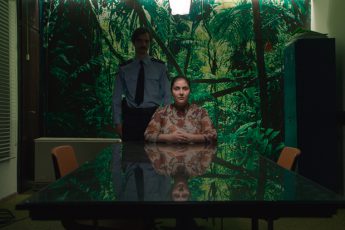Sacrificial Migrant
Juris Kursietis’ Oleg (Oļeg, 2019)
Vol. 97 (September 2019) by Anastasia Eleftheriou
That the cultural industry has not managed to change the dominant discourse on closed borders and xenophobia with artistic productions on migration and refugees is a now so blatantly obvious that it has become a platitude to point at its helplessness of raising awareness on these issues. What may be less obvious, is the cultural industry’s complicity in diverting from the lack of political action through its very culture of awareness. Consumers now seem to crave for more and more individual pain as a way of dealing with the general passivity vis-a-vis the political and moral obligations societies have towards asylum seekers, refugees and immigrants. Raising awareness has thus turned into a catchy slogan and its cultural manifestation into an effective way of undermining the call for action it purports to express. The recent monument to migration the pope unveiled during a special Mass on the 105th World Day of Migrants and Refugees on St. Peter’s Square, as a homage to the displaced, is perhaps the most perverted form of this culture. It is akin to building a museum for an ongoing war. The film industry is competitive in this kind of awareness-raising. Over the years it has established a pretty portfolio of its own, with aware films, aware film festivals (from the Berlinale to smaller, more alternative festivals), and aware slots and aware panels on fascism, racism and migration.
A recent addition to the lookbook is Oleg, Juris Kursietis’ second feature, which deals with the painful experience of a Latvian migrant worker who arrives in Brussels in search of a better life. Oleg (Valentin Novopolski) lands in Brussels in an airplane full of Eastern European citizens.1 The first part of the film is fast-paced: intense hand-held camera enhanced by a dynamic rhythm and excellent editing. We soon see Oleg working as a butcher in an industrial meat factory in Ghent. The factory seems to exclusively rely on cheap foreign labor, and some of the workers earn themselves extra-pay by dealing meat under the counter. Oleg is fired when a drunken Polish colleague, Krzysztof (Adam Szyskowski), loses a finger in one of the machines. The politics of the factory appear to be such that responsibility for work accidents is outsourced to the workforce. And so Oleg is scapegoated out of his group of fellow workers-migrants who are united by common languages and by their hatred towards the Romanians. Luckily, he is soon offered another deal by Andrzej (Dawid Ogrodnik), a member of a Polish mafia gang. Andrzej offers Oleg a room in a house where there is food, alcohol and a PlayStation — a way out of his erstwhile misery.
Andrzej also provides Oleg with a passport and money but uses the gift as bait to force Oleg to participate in the robbery of a taxi depot. It is never quite clear why Oleg does not escape from the toxic relationship with Andrzej or why he does not call the police. While fear is the reason given by the narrative, it is depicted too vaguely to establish a convincing master-slave pathology and contextually too weak to stand on its own; after all, Oleg has legal status. So what drove Oleg to naivety and passivity? A sense of belonging? Hope of earning money? Glimpses of a deeper personality are revealed by a parallel story, Oleg’s inner world, that comes back at different moments of the film, either as a separate universe in the beginning and end, or as an integrated part in the main narrative. This story also serves as an introduction: Oleg is lying in a field of snow and ice. The ice cracks and Oleg is sucked into the freezing water and struggles to get out. The music makes this more overwhelming for the spectator, and also underscores the religious symbolism at play. A voice over, supposedly Oleg’s own, speaks about the sacrificial lamb and the similar way in which he perceives his own destiny. Oleg visits a cathedral in Brussels and sees the famous 15th-century altarpiece Adoration of the Mystic Lamb that depicts the sacrifice of a lamb while a voice explains to tourists how this lamb represents the sacrifice of Christ. The religious connotations reappear in the end, when Oleg manages to get out of the freezing water towards his salvation and bends to kiss the icon held by an orthodox priest standing in the middle of the field – an image reminiscent of the Orthodox Epiphany tradition. Despite the strength of this parallel inner world, the film could easily do without it. Instead of completing the personality of the main character, as one would expect, the parallel world reveals more about the director’s insecurity about his social realist approach to filmmaking.
As in Ken Loach’s most recent films, Kursietis’ lesson in awareness is carried by a well-intended character who gets deprived of all of his dignity in a 100′-cruise-to-hell. Luckily, unlike Loach, Kursietis understands that the lamb does not have to be sacrificed, that awareness can be raised without graphic or symbolic bloodshed. The fact that although the film takes place in Belgium, the characters rarely interact with the city or with any native residents, gives the film a sense of globalized strength — a huis-clos as suffocating as the freezing water. Yes, these things do happen everywhere, and for Kursietis to choose Brussels, the center of the EU, as this “everywhere” can certainly be interpreted as symbolically suggestive. Sadly though, it remains only that.
And so one wonders who and what provides the context of poverty, hostility and marginalization. Unfortunately, Kursietis’ approach of victimizing individuals is much more likely to strengthen confusions over immigration and crime than to draw attention to the issue of why some migrants come to tolerate inhuman conditions and turn to crime (even worse, the women in the film are either passive girlfriends, prostitutes or opportunists.) But even if we grant Kursietis the benefit of the doubt, his film is more likely to feed into a culture of awareness which has been trained to sympathize with individual hardship, misfortune and bad luck, even if it befalls an “other” in order to divert from the more pressing issues of collective responsibility. Before the film industry can answer this question (and when it will, it will probably be too late), Oleg shall cry, and we cry with him as we become aware that he is the sacrificial lamb…




Leave a Comment